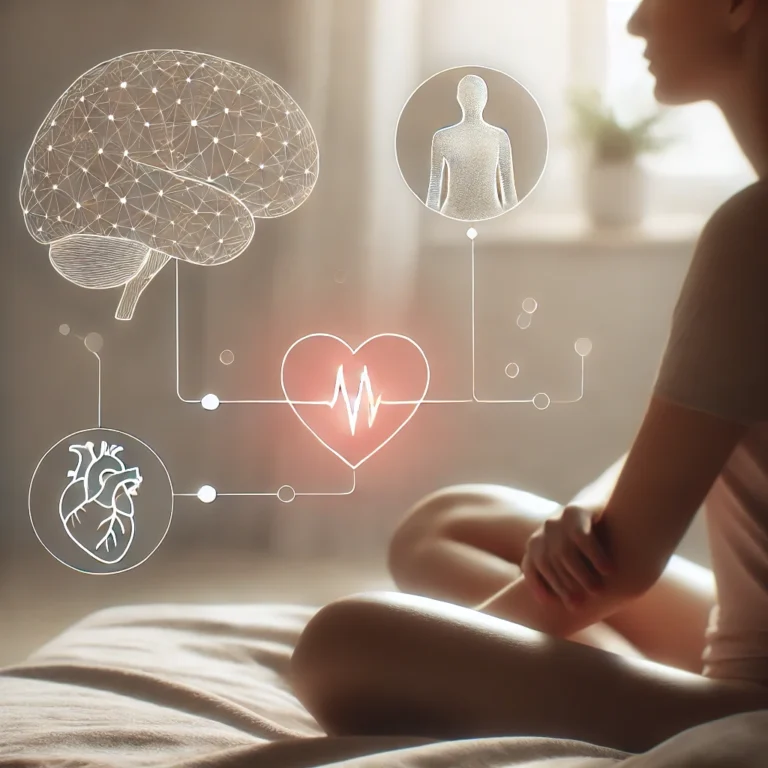Understanding Sexual Health
Sexual health involves physical, emotional, and social factors that collectively enhance overall well-being. Sexual health means not just the absence of disease but also positive relationships, pleasure, and informed sexual decisions. Embracing a comprehensive view of sexual health acknowledges that it interrelates significantly with mental health and emotional well-being.
Common issues affecting sexual health include STIs, sexual dysfunctions, and the psychological impacts of related challenges. For instance, conditions such as erectile dysfunction or lack of sexual desire can severely impact a person’s self-esteem and confidence, leading to decreased mental health and increased stress or anxiety.
Lifestyle choices like substance abuse or inactivity can worsen sexual health issues, creating a cycle harming both sexual and emotional wellness. The importance of sexual health extends beyond the individual. It can profoundly influence personal relationships. Healthy sexual relationships can foster emotional intimacy, enhance relationship satisfaction, and contribute to a nurturing environment.
Conversely, sexual health issues can cause tension, insecurity, and emotional distance, underscoring the deep connection between mental health and intimacy. Understanding and addressing sexual health is, therefore, crucial for enhancing mental wellness and fostering healthy relationships in various life domains.
In summary, sexual health is crucial to overall health, shaping personal well-being and enriching interpersonal relationships.
Promoting sexual wellness enhances mental health, highlighting the strong connection between these essential aspects of human well-being.
The Role of Mental Health in Sexual Well-Being
The relationship between mental health and sexual health is complex and multifaceted, with considerable implications for individuals’ overall well-being. Mental health conditions, such as depression, anxiety, and chronic stress, can significantly influence sexual health and functioning.
When an individual experiences psychological disturbances, their libido may diminish, leading to reduced sexual desire and satisfaction. Depression often reduces sexual interest, impacting individuals and partners, and disrupting intimacy in relationships. Anxiety can manifest in various ways that hinder sexual performance. Performance anxiety and intimacy fears may cause avoidance, making sexual encounters feel increasingly overwhelming.
This anxiety not only impacts sexual performance but can also cultivate feelings of inadequacy and decrease overall self-esteem. Stress is another critical factor that can impair sexual health; elevated stress levels can inhibit the body’s natural sexual response, resulting in decreased arousal or difficulty achieving orgasm. Difficulty in sexual activities can worsen unease and negatively impact emotional well-being.

Addressing mental health issues is crucial for enhancing sexual wellness and emotional health. By seeking therapeutic support or engaging in self-help strategies, individuals can mitigate the negative psychological effects of sexual health issues. Additionally, improved mental health can lead to greater sexual satisfaction, positively influencing personal relationships.
Mental health and sexual intimacy are intricately linked, suggesting that by fostering a positive mental state, one can also enhance sexual experiences. Promoting mental wellness in conjunction with sexual health can lead to more fulfilling interactions, offering both partners a deeper emotional connection and a more satisfying sexual life.
Strategies for Improving Sexual and Mental Health
Enhancing sexual health and mental well-being is an integral process that can significantly contribute to an individual’s overall quality of life. This can be achieved through various actionable strategies that emphasize open communication, professional guidance, and lifestyle choices. One fundamental approach is to foster open communication with partners.
This involves discussing desires, preferences, and concerns related to both sexual health and emotional well-being. Such dialogue strengthens intimacy and alleviates misunderstandings that may arise due to lack of clarity. An open exchange can create a safe environment where both partners feel valued and understood, thus improving both sexual satisfaction and mental health.
Seeking professional therapy is another effective strategy. Mental health professionals can guide individuals and couples through challenges related to emotional well-being and sexual health. Therapy sessions provide a platform for exploring issues that complicate sexual intimacy or mental health, allowing for tailored coping strategies. These interventions can lead to a deeper understanding of the sexual health and mental health connection, enabling individuals to navigate their relationships with more resilience.

Additionally, practicing mindfulness and self-care techniques fosters an enhanced mental state, which is beneficial for sexual wellness. Engaging in activities such as meditation, yoga, or even simple breathing exercises can mitigate stress and anxiety, creating a more conducive environment for sexual intimacy.
Furthermore, a commitment to a healthy lifestyle—incorporating regular exercise and balanced nutrition—plays a vital role. Physical health directly influences emotional well-being; therefore, an emphasis on physical fitness can yield substantial mental health benefits.
Incorporating these strategies not only contributes to better sexual and mental health but also cultivates a holistic approach to overall well-being. By addressing these two interrelated aspects, individuals and families can navigate their lives with enhanced emotional and psychological stability.
Resources and Support for Sexual and Mental Health
Addressing the interconnectedness of sexual health and mental health is crucial for holistic wellness. Individuals seeking support can find a variety of resources tailored to both sexual health and mental well-being. Numerous reputable organizations offer valuable information and services. For example, the American Psychological Association (APA) provides evidence-based resources on psychological health, including the effects of sexual health on mental wellness. Their website hosts articles, research findings, and directories of professional support.
Similarly, the Sexual Health Alliance offers comprehensive educational materials and training programs focused on enhancing sexual wellness and emotional health. Their mission is to destigmatize discussions around sexual intimacy and empower individuals to improve their overall quality of life. Moreover, organizations like Planned Parenthood offer counseling services, sexual health education, and a wealth of resources that highlight the psychological effects of sexual health.
Online platforms also play a significant role in providing accessible support. Websites such as BetterHelp and Talkspace offer teletherapy options that cater to individuals looking to discuss issues related to both mental health and sexual well-being. These services allow individuals to connect with licensed professionals specializing in the mental health and sexual wellness segments, thereby enhancing accessibility and comfort during discussions that may be sensitive.
An integral part of navigating sexual and mental health is the strength of community support. Joining local support groups or online forums, like Reddit or mental health apps, offers a safe, anonymous space to explore stress, anxiety, and sexual health connections. Equipping yourself with accurate information and support is essential to improving mental health through sexual wellness and understanding their vital connection.






